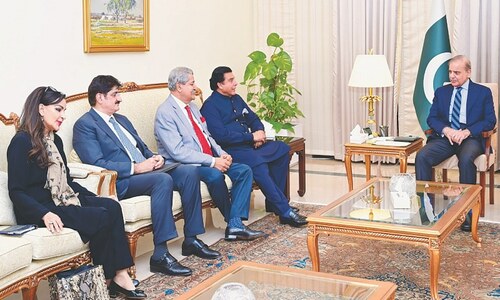WASHINGTON, Jan 12: The US State Department imposed sanctions on Monday on 13 individuals and firms and Dr A.Q. Khan figures prominently on the list, indicating that the United States still considers him a dangerous proliferator of nuclear weapons.
An official notification also urged the international community to “remain vigilant” to ensure that the network did not resume its activities.
The sanctions order noted that Dr Khan had admitted his guilt but later retracted his statements. The move indicates that his efforts to exonerate himself through the Pakistani judicial system had not impressed Washington.
“We believe these sanctions will help prevent future proliferation-related activities by these private entities, provide a warning to other would-be proliferators,” the State Department said. “And (will) demonstrate our ongoing commitment to using all available tools to address proliferation-related activities.”
The sanctions followed a multi-year US government review of information regarding the A.Q. Khan network.
The notification included a brief description of the network.
According to this description, Dr A.Q. Khan led an extensive international network for the proliferation of nuclear equipment and know-how that provided “one stop shopping” for countries seeking to develop nuclear weapons.
He and his associates provided Iran and Libya with centrifuge components, designs, and, in some cases, complete centrifuges. The United States also believes that Dr Khan and his associates provided centrifuge designs, equipment, and technology to North Korea.
Dr Khan also provided Libya with nuclear weapon designs. With the assistance of his network, countries could leapfrog the slow, incremental stages of other nuclear weapons development programmes.
The State Department noted that in 2004, following Libya’s “welcome decision” to renounce its nuclear programme, the United States removed from Libya items it had received from the network.
“The network’s actions have irrevocably changed the proliferation landscape and have had lasting implications for international security,” the department observed.
It pointed out that governments around the world, including Pakistan, South Africa, Turkey, the United Kingdom, Germany, the United Arab Emirates, Switzerland and Malaysia worked closely with the United States to investigate and shut down the network.
Governments have also joined together to put in place United Nations Security Council Resolution 1540 to criminalise proliferation and have worked cooperatively to establish the Proliferation Security Initiative to enhance international tools to interdict and prevent trade in sensitive technologies, the statement said.
The State Department noted that many of Dr. Khan’s associates were either in custody, being prosecuted, or have been convicted of crimes.
The department also pointed out that Dr Khan publicly acknowledged his involvement in the network in 2004, although he later retracted those statements.
“While we believe the A.Q. Khan network is no longer operating, countries should remain vigilant to ensure that Khan network associates, or others seeking to pursue similar proliferation activities, will not become a future source for sensitive nuclear information or equipment,” the State Department warned.
The sanctioned individuals and companies were listed by the State Department as: Selim Alguadis, Kursad Zafer Cire, Muhammad Nasim ud Din, EKA Elektronik Kontrol Aletleri Sanayi ve Ticaret A.S., ETI Elektroteknik Sanayi ve Ticaret A.S., Muhammad Farooq, Paul Griffin, Peter Griffin, Abdul Qadeer Khan, Shamsul Bahrin bin Rukiban, Buhary Seyed Abu Tahir, and Shah Hakim Shahnazim Zain.
Sanctions have also been imposed under the US Export-Import Bank Act against the people and firms mentioned above as well as Daniel Geiges, Gotthard Lerch and Gerhard Wisser.














































Dear visitor, the comments section is undergoing an overhaul and will return soon.